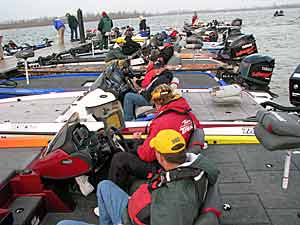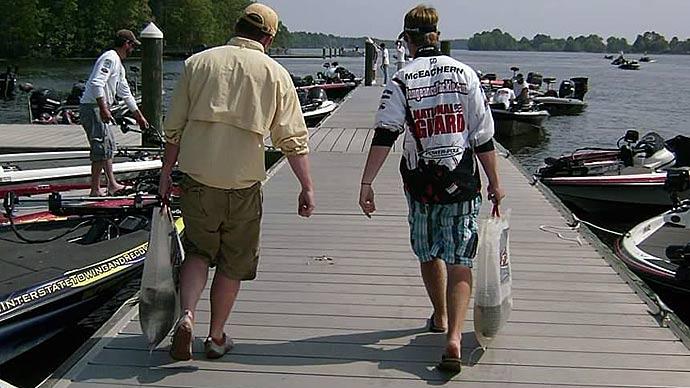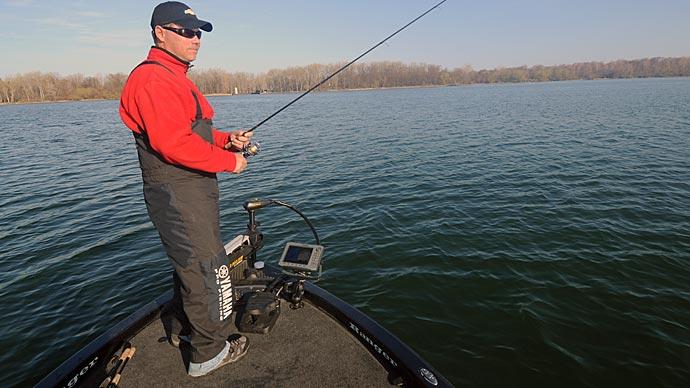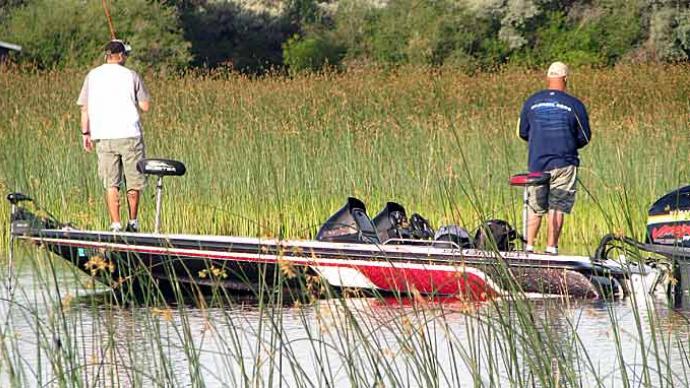
The recent $700,000 win by David Dudley of the Ranger M1 tournament was exciting. It also brought a flood of comments about "how" he won. The question was if what he did to win the tournament was ethical. It should be noted that it certainly wasn't against the rules, or he would have been disqualified instead of collecting any money.
Some people want to know when a chainsaw became a standard part of bass boat equipment. Then there's another faction, the other side of the coin, so to speak, of those who believe it was a brilliant move to access water untouched by other anglers. Indeed it was nice that it was a sponsor's chain saw purchased in another sponsor's store.
Interpreting rules have had tournament directors scratching their heads and rewriting them since tournaments began. Whatever new rule is written, it can, and will, be read - into, over, under, around, and between lines by contestants.
Various new fishing "techniques" have been used in the competitive field that tends to give a strong indication of the intelligence of anglers. Cutting timber to gain access to protected waters and other such things is not any newer than putting out brush piles that only you know the whereabouts of.
But is it ingenuity or reading between the lines of the rules to decipher how far one can bend them to the extreme to win? So the big questions about what lures he used etc., were replaced with, "Is it against the law to use a chainsaw on public water?" It is if it's done on private or government land, and you must trespass to accomplish the task. Some folks ask if cutting down trees to cut off the back of a small cove wouldn't be a good idea. This, too, and more has already been done. Ingenious anglers have been using their brains for years to be the best and win loads of dough.
One must remember that in most cases, these scenarios broke no rules. However, tournament rules would have to read like a dictionary to cover all such situations and be about as lengthy.
These controversies never arise if all contestants understand and interpret the "unwritten" and written rules precisely the same way. In a perfect world, they do. But the ever-competitive spirit of human beings creates a rather aggressive atmosphere on the lake and in everyday life. Those who find the best way to achieve the final desired result will surpass those who do not. It's called winning.
You pay your money, take your chances within the rules and state laws, and make the best of it. If you are quick of mind and can reason ways to adapt "extras" that will benefit you over your competition without breaking the rules, you most definitely will gain the advantage. Again, this is not cheating. It's using that portion of your brain that some people forget to use while competing - the part that understands strategy. And while I can appreciate all the valiant comments about fishing "against the fish," not the other competitors - it's a very noble "bunk." Who wouldn't want to be able to say they beat Rick Clunn?
It's still possible to do all the work, planning and plotting on some unique trick like chain-sawing limbs, and still need to win the tournament. It's also possible to injure yourself while attempting such a drastic tactic. Chainsaws and rocking boats are not a good mix for safety.
Other sides of the many-faceted premise of tournament etiquette and fairness would have to include the human mind's variations of what defines "your" water. Significant controversies have raged over who was fishing where the day or hour before and just whose water it is. Professional anglers define these elements in an unwritten code, but - at least in most semiprofessional and amateur events - it's your water if you get there first. Some professional event holders do define 'your water" as the water you fish during pre-fish practice days. Fair enough, but respecting someone's water is still a very tricky and technical issue. If they aren't fishing it all day, should it still be "his" all the time? How long would it be before a whole lake "belonged" to one guy?
Larger tournament fields almost guarantee that there will be some dispute over one or more popular holes. But to believe that it takes a year of someone "not fishing" a hole defines it as up for grabs is a bit out there in smaller, semi-professional events. There aren't enough holes on any given lake, even in Texas, for this to be a realistic standard of sportsmanship except at the very top of the chain.
Both respecting the water of others, and freely sharing it, come under the heading of manners. Like on the freeway, you can be a jerk or play fair and act sensibly. That's a choice no tournament rules can control. As applied to fishing tournaments, the code of ethics isn't all written into the rules. It's "understood." Unfortunately, not by everyone who competes.
We published an article about sportsmanship and ethical public water use years ago. Likely as not, most people who read it did not need to. While tournament contestants catch the brunt of flack about being rude on the water, plenty of people - who just bought their first boat and haven't a clue - are out there whooping it up and running over everyone else. But again, there are rude tournament anglers, just as there are people who drive rudely on our highways. This is a fact of life brought on not by society or even how much money they can win but by their not knowing any better (as in their mamma should have paddled their behinds and taught them about manners). But as a high-profile group on any body of water, tournament contestants are naturally singled out instead of average anglers and boaters. They're more visible.
And fairness, or a lack thereof, doesn't just begin with the contestants themselves. It can even originate from within an organization, according to some contestants. But directing events is challenging, and interpreting the rules can be extremely difficult.
In the payback fairness department, while most tournaments offer a fair payback, some anglers still need to equate what's paid out with what's paid in. Most events "pay out" more than paid in via prizes, for which contestants do not pay. The only exception can be boats, which generally are indicated as their "retail value" but are usually purchased at, or less than, dealer cost. Thus if 200 teams pay a $200+ entry fee, it's easy for event holders to "give away" a boat they might have paid around $16,000 for and still make a profit. With lesser entry fees, that's a little more challenging to accomplish.
Tournament directors cannot stay in motels, eat in restaurants, and give up leisure time they might have had that weekend - all for free, either. Thus most events offer an 80 percent payback. Some events use "100 percent paybacks" as a drawing card. The only problem with all this is that no one can afford to work for free in the real world. There are expenses to cover, and by and large, most people holding tournaments with entry fees under $200 or less than a couple of hundred contestants aren't getting rich doing so. The money paid in is the money paid out. If you're fishing for "100 percent," - you paid it in one way or another. It wasn't given to you out of the kindness of someone's heart. A store could only stay open for a short time if all their merchandise were "free.
Which leads to the question, who do you think paid for the big party at the end of the season? By their very nature, Championships require some massive funding to be done right. Event holders must obtain sponsorships, accumulate money from contestants, and sometimes have to make up the rest themselves. Most anglers understand and appreciate this, but some don't see it.
To have a fair game for competitive anglers is a beautiful thing, but it must also be fair to those who will do the work for you while you're there and provide prizes and extras. With the shoe on the other foot, those who hold events must be fair in turn to the best of their ability. They must interpret the rules with integrity and use unbiased methods in applying them to events.
It isn't always easy on either side of the fence, but I still believe it's almost always fun. Some of my and Jerry's best times were spent on the lake fishing at a tournament. Of course, things being what they are in the real world, some of the most tedious moments came then too. Broken trolling motors, high wind, or other discourteous weather. You name it - if it can happen, it will happen right after you pay your entry fee. Heck, I'm the best weather forecaster in the state. All I have to do to know how bad the weather will be is for Jerry and me to enter a tournament that weekend. Sure 'nuf, it'll be nasty. But it's also a sure thing that we'll have more great stories and memories to share.
That's fair enough for me.



